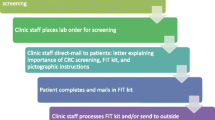Abstract
Background
Patients from ethnic minorities are under-represented in referrals to cancer genetics services. In a regional genetics centre that serves two London boroughs, the existing service attracts 3% of its referrals from Black and Minority Ethnic (BME) and other ethnic groups, despite the fact that these groups make up 34% of the population.
Objectives
To improve access to familial cancer risk assessment in a socially and ethnically diverse population.
Setting
The London boroughs of Lambeth and Southwark.
Design
Community-based, nurse-led clinics were established for people who were concerned about their familial cancer risk. Patients were asked to triage themselves by answering three questions. Self-referral was encouraged.
Main outcome measures
Data were gathered on ethnicity of clients, cancer risk, source of referral and patient and health professional satisfaction with the service.
Results
Of the 415 people who have accessed the service, 46% were from not White British groups and 67% referred themselves to the service, demonstrating the success of this model in reaching ‘hard to reach’ groups. Thirty-seven percent of patients were assessed as being at population risk and 63% were assessed as being at moderate risk or higher, showing that the clinics were meeting an unmet need in the community.




Similar content being viewed by others
References
Department of Health (2003) Our inheritance, our future—realising the potential of genetics in the NHS. Government White Paper
Indices of Deprivation (2004) Office of the Deputy Prime Minister http://www.communities.gov.uk/index.asp?id = 1128440. Cited 20 March 2007
Office for National Statistics (2006) http://www.statistics.gov.uk/StatBase/Product.asp?vlnk = 14238 (Population estimates by ethnic group 2001–2004: CSV data (experimental statistics)). Cited 20 March 2007
Chinegwundoh F, Enver M, Lee A, Nargund V, Oliver T, Ben-Shlomo Y (2006) Risk and presenting features of prostate cancer amongst African-Caribbean, South Asian and European men in North East London. BJU Int 98(6):1216–1220
Meiser B, Eisenbruch M, Barlow-Stewart K, Tucker K, Steel Z, Goldstein D (2001) Cultural aspects of cancer genetics: setting a research agenda. Journal of Medical Genetics 38(7):425–429
Macmillan Cancer Support (2001) The ‘Kenilworth’ service delivery model. Internal document produced by an expert working group convened by Macmillan Cancer Support and the Department of Health
McIntosh A, Shaw C, Evans G, Turnbull N, Bahar N, Barclay M, Easton D, Emery J, Gray J, Halpin J, Hopwood P, McKay J, Sheppard C, Sibbering M, Watson W, Wailoo A, Hutchinson A (2004; updated 2006) Clinical guidelines and evidence review for the classification and care of women at risk of familial breast cancer. London: National Collaborating Centre for Primary Care/University of Sheffield. NICE guideline CG014. www.nice.org.uk
Dunlop M (2002) Guidance on large bowel surveillance for people with two first degree relatives with colorectal cancer or one first degree relative diagnosed with colorectal cancer under 45 years. Gut 51(Suppl V):v17–v20
Dunlop M (2002) Guidance on gastrointestinal surveillance for hereditary non-polyposis colorectal cancer, familial adenomatous polyposis, juvenile polyposis, and Peutz-Jeghers syndrome. Gut 51(Suppl V):v21–v27
Acknowledgements
We are grateful to Neil Robertson, who provided computer support, Ruth Cudjoe, April Matthews, Jamie Ferguson and the members of the project steering and user groups, the patients who took part in the project and their families, and colleagues in primary, secondary and tertiary care who provided support, office space and enthusiastic encouragement. We are also grateful to Macmillan Cancer Support and the Department of Health who funded this project.
Author information
Authors and Affiliations
Corresponding author
Rights and permissions
About this article
Cite this article
Jacobs, C., Rawson, R., Campion, C. et al. Providing a community-based cancer risk assessment service for a socially and ethnically diverse population. Familial Cancer 6, 189–195 (2007). https://doi.org/10.1007/s10689-007-9134-z
Received:
Accepted:
Published:
Issue Date:
DOI: https://doi.org/10.1007/s10689-007-9134-z




